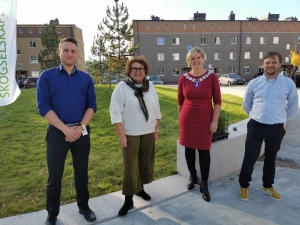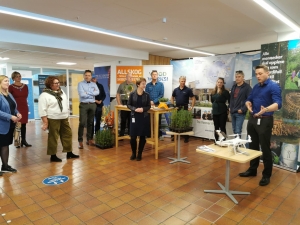TECH4EFFECT presents drone mapping, T-winch at Norwegian Ministerial event
TECH4EFFECT talks to national and local government representatives, including industry partners, wood associations and the media about drone usage and technologies to minimise environmental site impact.

Pictured (l-r): (Title) NIBIO researcher, Dr Joachim Bernd Heppelmann; Minister of Agriculture and Food, Olaug Vervik Bollestad; Mayor of Steinkjer, Anne Berit Lein; and NIBIO Station leader Steinkjer, Lars Bendik Austmo.
TECH4EFFECT (T4E) partner representative, Dr Joachim Bernd Heppelmann, from the Norwegian Institute of Bioeconomy Research (NIBIO) and Statskog, was invited recently to the official opening of a new Norwegian Agriculture Agency office in InnoCamp, Steinkjer to talk about his work on the project. The office was opened by the Norwegian Minister of Agriculture and Food, Olaug Bollestad.
The Norwegian Agriculture Agency falls under the umbrella of the Norwegian Ministry of Agriculture and Food. It functions as the national authority that implements agricultural policies uniformly across the country, and throughout the value chain.
Particularly, the Agency oversees value chain capture growth across the agricultural and forestry sectors. It also ensures that an adequate resource base is secured for production.
TECH4EFFECT to improve value chains
TECH4EFFECT was invited to address the event in the context of encouraging efficient value chains through increased digitalisation and wood mobilization measures, with an emphasis on environmental site management, made possible through joint BBI-JU/H2020 funding.
NIBIO has contributed its expertise to the project by improving the environmental performance of forest operations through actively recording and storing information on the extent and severity of soil disturbance, amongst other subjects.
Drones map harvester driving patterns

Joachim explains how drones help in mapping site impact
Recently, some of the research has involved using drones to map wheel ruts in harvesting operations. Additionally, studies have been carried out specifically mapping the driving patterns of machine operators, which is a tell-tale sign of how a driver behaves, and whether they adhere to environmental best practice, the results of which should be published soon.
“The use of digital tools, such as drones, and digital modelling, like orthomosaics, are helpful in mapping environmental site impact in that the depth of wheel ruts can be calculated. The studies carried out by T4E are instrumental in developing strategies to reduce and, even avoid, site impact in the future. The more we can map environmental impact to determine where sensitive sites are located, and even understand how machine operators drive, the better we can plan and manage future harvesting operations,” Heppelmann said after the event.
T-winch trials
Heppelmann also spoke to the audience about the upcoming T-winch trials that would be conducted together with TECH4EFFECT partners, Ponsse, which is the world largest manufacturer of Cut-to-Length machines, and the Norwegian Forest Owners Association, Allskog. Within these trials, the T-Winch produced by Austrian steep terrain engineering specialist, Ecoforst, will be tested regarding the potential to minimise environmental impacts, and improve productivity during tethered harvesting operations in steep terrain in western Norway. The tests will be performed this Autumn and are also part of the ‘site impact’ work package of the T4E project.
WoodWorks! cluster for valorisation, employment
NIBIO is also part of the WoodWorks! cluster which was in attendance. WoodWorks! is taking wood usage to new levels above the typical Nordic construction story, which is instrumental in carbon capture, to represent the complete value chain initiative by using wood fibres in side streams for their use in medicine, food, animal, fish feed, and much more.
While the WoodWorks! cluster is an old industry, originating in central Norway, it is growing rapidly as global market trends demand more innovative value chains which help green economies and provide valuable employment. Read about the cluster here.
Due to the Corona pandemic, the event was attended by a maximum of 40 carefully selected representatives from the relevant agricultural and forestry sectors, as well as the national Norwegian TV channel and regional press.
This project has received funding from the Bio Based Industries Joint Undertaking under the European Union’s Horizon 2020 research and innovation programme under grant agreement No 720757.
________________________________________________________________________________________________________________________________

Dr Joachim Bernd Heppelmann is a postdoc researcher in the Division of Forest and Forest Resources of the Norwegian Institute of Bioeconomy Research (NIBIO). His speciality is in fully mechanised harvesting operations, focusing on large machine operations and remote sensing.
His research encompasses evaluating harvesting operations and machine applications, with a focus on productivity and environmental impact. He was significantly involved within the adaption of Debarking Harvesting Heads for central European conditions. Within his current research for the BBI JU/Horizon 2020 – Tech4Effect project – he assess driving patterns and rut damage, using drones and remote sensing approaches to link the severity of the damages with pre calculated Depth-to-Water information. Furthermore, he took the lead on investigating the tethered harvesting operation utilising a T-Winch supported harvesting approach in steep terrain of western Norway.
Contact details:
Dr Joachim Bernd Heppelmann
Phone +47 458 66 176
Email: Joachim.heppelmann@nibio.no
Media Contact:
Philippa Webb-Muegge
RTDS, Vienna
Phone: +43-1-3231000
Email: Philippa@rtds-group.com


